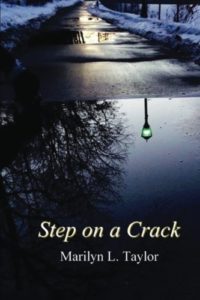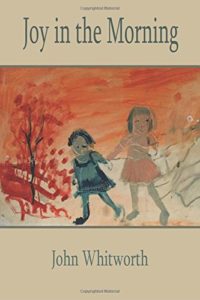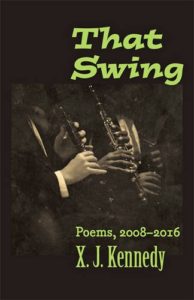If you have a book you’d like considered for a review in Light—one that includes a large helping of light verse and was published within the previous 12 months, or that will be published in the next six—please send a copy to:
Barbara Egel
PO Box 408250
Chicago, IL 60640
(Pre-print-run electronic copies may be sent to lightpoetryreviews@gmail.com)
Light on Their Feet
(Reviews of books by Bruce Bennett, X.J. Kennedy, Daniel Klawitter, Marilyn L. Taylor, and John Whitworth)
by Barbara Egel
The books reviewed in this issue—the most recent works by some true giants of light verse—are just right for late summer and fall: they get dark earlier and induce a bit of a chill, but once you’re well into them, they also bring lots of laughter.
Bruce Bennett. Just Another Day in Just Our Town: Poems New and Selected 2000-2016. Orchises Press, 2017.
In an author’s note that precedes the title page of Bruce Bennett’s new book, he claims not to have included light verse “except for the parodies and take-offs.” Dear Professor Bennett, I think you need a better editor, as there is much in this book that qualifies as light verse and much to enjoy for readers who have become Bennett fans after discovering you in Light‘s pages.
As with the other poets reviewed, there is a definite undercurrent of things-wrapping-up. Themes of aging and ending inform the first and last sections of the book as well as individual poems throughout. There is also a startlingly large collection of dead animal poems. Many, such as “The White Duck,” suggest the unsentimental poignancy of William Stafford, while “Sidewalk Scene” calls to mind, unexpectedly, the moral onion-peeling of Maurice Sendak. Even in this elegiac mode, Bennett’s light-verse cred serves him well. “Small Town Haiku” fits the mood of the poems that surround it, but it would also be welcome in Light:
“I said Hello.
I always say Hello.
I know it irritates him.”
That the entire poem is in quotation marks somehow makes it funnier, as though journalistic accuracy is the most important goal of these seventeen syllables.
Bennett is a master of repeated lines, using them like whipstitches to reinforce mood. The title poem of the collection exemplifies his skill, using simple language to tell of the ultimate banality of living and dying:
The people who have yet to die are here.
They go about their business, unperturbed.
Their duties and their consciences are clear.
The people who have yet to die are here,
and do not think they too will disappear.
The third through fifth sections of this book are where we’re intended to have fun—quite freeing after the ambivalence of enjoying poems about murdered chipmunks, overblown literary ambition, and parental jokes that terrorize small children. “Loose Canon” is the longest section of the book, and that is very lucky for us. Bennett’s parodies of and tributes to Famous Poets feel almost mathematical, as though the poet is thinking, “Let’s change one variable and see what happens.” In “Brown Penny Revisited,” Bennett has changed two of Yeats’s variables, adding several decades to the persona and replacing the happy chance of the penny with the cold appraisal of a mirror and the what-the-hell wisdom of age:
Yes, love is the crooked thing,
So why not give it a shot?
Girls don’t always want a stud.
One doesn’t have to be hot.
She may think I’m funny and cute,
At least long enough for a date.
For me that is good enough.
It is never never too late!
My knee-jerk reaction is to picture Emily Dickinson casting a skeptical eye on modern technology, but Bennett has changed my mind on that. “Emily on the Net” and “Perfect Company” imagine Miss D’s interactions with today’s devices: if only she’d had ear buds, she might have ventured out—world seen and shyness preserved. But just as Bennett’s touch with light verse tempers the serious poems, the parodies don’t shy away from stronger medicine. “The Fix” gives the Belle of Amherst a prescription for Zoloft. The results are not pretty.
The most complex of the parodies is “Breaches,” in which Frost’s musings on a boy’s pleasures and the vagaries of love are replaced by the persona’s longing to escape the pathless wood of undergraduate indifference. But as is Bennett’s way, the birches return in the end, and the speaker thinks of climbing them for a different sort of transcendence: to escape from his academic rut.
This book also includes an entire section of villanelles. If a good villanelle is like a musical canon—becoming deeper and richer as it echoes in the mind—a bad one is like a Journey song heard at the supermarket, clanging on the brainpan for eternity. Thus the idea of twenty-six in a row gave me the vapors. However, Bennett tackles that issue head-on with several villanelles that parse the claustrophobic difficulty of the form. “Pas de Deux” describes how its strictness is Fred to the poet’s Ginger:
The form is part of what I want to say.
It makes a case for that right off the bat.
It states itself, and then shows me the way.
As the section progresses, Bennett moves away from overt discussion of the form to lovely examples of it, even arguing with Dylan Thomas’s famous villanelle and making it fit the overall theme of this book:
Why not go gentle into that “good night”
and quietly accept the close of day?
Why rage against the dying of the light?
This is a large book both in scope and length (214 pages), and it will take you many places—some unspeakably sad, some hilarious, all thoughtful and all most certainly worth the price of the ticket. That said, I eagerly await the volume of purely light verse promised in the author’s note. I just pray there are no decapitated ducks.
Marilyn L. Taylor. Step on a Crack. Kelsay Books, 2016.
More elegies, more elegies! And more caveats from your reviewer. Yes, this is Marilyn Taylor’s darkest book. But there is much in it that will make you spew your coffee (or, my recommendation, something stronger) as you laugh out loud. Taylor appears to have reached the stage—as a poet, anyway—of not giving a damn about what one ought to do, and the result is gorgeous. Indeed, if this book has an overall effect, it’s one of subverted expectations. From poem to poem and within poems, both form and content surprise.
The first delight of this book is that Taylor is all over the place with regard to form. There is free verse and blank verse, Sapphics and sonnets. There is even a heartbreaking prose poem. Generally, I think of Taylor as a meter maven, so the freedom she grants herself is intriguing. Still, the discipline of meter is clearly so ingrained in the nonmetrical poems that those of you who hear “free verse” and shudder have nothing to fear.
The first part of the book focuses on childhood both lived and observed. “Always Questions” dreams up a valid reason for the uptalk so many young people (especially female ones) practice to the dismay of their elders. Perhaps, Taylor speculates,
. . . they are the representatives
of a long-out-of-date civility—
these gentle souls who speak in tentatives,
and always dwell in possibility.
The generosity of this thought is moving and typical of the poems in which Taylor’s persona observes younger generations. But while these poems offer great latitude for growth to the nascent and naive, adults who should know better come in for a thrashing. The anger is naked and stunning in “A Sestina for My Mother.” The inclusion of the form name in the title reinforces the strictness of one of the most controlling verse structures, almost as though this poem has to lock itself up tightly for its own safety. Without giving away the gasp-inducing ending, I offer the penultimate stanza as a taste. (The “her” is the mother who was brutally wronged):
. . . I have become the wicked old
witch. I am Grendel’s mother, because
of her pain. I am the bat out
of Hell. I am Goneril, or better
still, Hecate. And with my wild torch, I
will light her way at last.
“Tercets from the Train” similarly shocks with its ending and indictment of both a mother who wrongs a child and the people who sit by in silence.
This is a much shorter book than the others reviewed here, so there is less room for gradation, but Taylor sticks with her theme and mood even as she moves from heavy to light. The sharp edge of the elegiac poems never quite leaves, even in the overtly funny ones. The sonnet “Compulsory Figures” seems to be another serious childhood memory poem, this time about being the ignored older sister at the ice rink while the cute three-year-old dominates daddy’s attention. However, after the turn, we are treated to “askance” rhyming with “ruffled pants,” and “Tonya Harding’ed” as a verb. In “Open Letter to Grownup Kids Who Call Home,” Taylor proves she is the bard of the empty nester (see her “Home Again, Home Again”), and in “A Commencement Villanelle,” a McGinley-like parental sigh issues from an elder who wants to give the graduate “everything he needs to know,” while realizing “I don’t think he’s going to like it, though.”
“Reading Alcott, 1962” should not be read in a place where silence is the rule (trust me on this). In it, Taylor takes on the voice of a girl reading Little Women and resetting it in her own ’60s milieu. She imagines tending to her little sister in the way the March sisters tended to Beth, but instead of The Pilgrim’s Progress, this girl would read her sister Tropic of Cancer and sing her bawdy songs. The specificity of how adolescents fantasize—that a plot, while sad, might be put to solipsistic good use in the present—is spot-on, and the details of the poem are hilarious.
If you are a fan of Marilyn Taylor, this book will surprise and please you. If you are not (yet), it is an excellent introduction to a poet who blends honesty and sanity with precision and dry-martini humor.
John Whitworth. Joy in the Morning. Kelsay Books, 2016.
Do not guzzle down this book in one sitting. You will become utterly disoriented, you will be unable to speak in your usual cadences, and you will cause concern among your loved ones. Do read it, however, in small sips. In Joy in the Morning, both sound and sense are made to do things nature quite likely never intended but which Whitworth makes seem as natural as swallowing—if your esophagus were designed by Rube Goldberg. If you have read Whitworth’s previous work, all the expected concoctions are on tap. If you have not, well, belly up to the bar and brace yourself.
Whitworth’s antecedents include W.S. Gilbert (to whom he acknowledges a debt) and Cole Porter, whose way with a rhymed list Whitworth matches in poems such as “Cosmic Dust” and “The Pen Is Mightier.” But that might lead you to imagine a sort of quaint, codgery kind of poetry that this is certainly not. Whitworth applies old-school rhythm and rhyme to whatever enters his modern ken—including but not limited to English politics, current sexual mores, contemporary (and not so) art and literature, and the music of The Clash and the rap group The Underachievers. He has even written the ultimate verse response to the Twilight phenomenon in “My Boyfriend.” Such pressure of confinement can lead to all manner of fabulous silliness.
Part of the reason such relentless versifying, while potent, doesn’t get old is that Whitworth puts every crumb of his large vocabulary to active use—”rhizome,” “etiolated,” “nenuphar,” “lexeme”—as though such words were always available for everyday rhyming. Thus, the surprises come thick and fast. “Crumply / fait accompli,” “Ouija / procedure” and the magnificent “Harry Truman / ichneumon” are particularly memorable. Indeed, the process of reading a Whitworth poem should go something like this: read it once at the breakneck pace inherent in most of the poems, noticing—like Alice falling down the rabbit hole—that there are interesting things flying past, but you mustn’t stop until you land at the end. You may then go back to the beginning and savor the treasures of rhyme and reference that you whizzed by the first time.
As mentioned, topics range far and wide. There are the mostly sound- and word-play poems that feel like Pop Rocks on the brain. Try this sample from “Adlestrop Unwound”:
I’ve quite forgotten Adlestrop,
Upper Slaughter, Lower Slaughter
Foggy Bottom, Devil’s Drop,
Faintly-Furtive-in-the-Water . . .
But if all this fun makes you think Joy in the Morning would make a nice family read around the breakfast table, be warned that not for nothing is Whitworth the editor of The Faber Book of Blue Verse. Some of these poems are adult indeed. (A favorite rhyme of Whitworth’s is “Venus / penis,” which appears at least three times.) Not only is there a bawd about the book, but several poems range from uneasy to pants-wettingly scary, such as “Red-Planet Random,” which puts into verse a Blade Runner-like dystopia, and “Burglars,” which includes:
Every burglar, knowing children
will be coming very soon,
Licks his blubber lips and mutters, You are mine!
You are coming, little children,
in your ones and twos and threes,
You are hurrying
because it’s getting late,
You are thinking of your mummies,
you are thinking of your teas,
When perhaps you should be
thinking of your fate.
You may be startled to find simplicity and sweetness amid the thrilling cacophony and chilling suspense. “Little Chris in the Garden” employs Whitworth’s sound games in the service of describing a little boy playing, ending with,
This is the boy in his shadowless summer and
This is this sight and the sound of forever,
The boy in his garden of gold.
“All The Things” demonstrates Whitworth’s penchant for list poems to describe all the ways the beloved is perfect—and what she isn’t surprises as much as what she is:
Like the quintessential nothing
Of your absence from a room,
Like the echoes multiplying down
an empty catacomb,
Like the rightness of fried eggs
in their affinity with ham,
Like the rightness of Rhett Butler
when he doesn’t give a damn.
Oh, and one poem, “Defining of Terms,” explains the game of cricket such that I’ve come significantly closer to understanding a pastime with only somewhat fewer rules than the Geneva Conventions.
X. J. Kennedy. That Swing: Poems 2008-2016. Johns Hopkins University Press, 2017.
Your devotion to light verse don’t mean a thing if you ain’t got X. J. Kennedy’s new book. (Too obvious? Too bad.) Kennedy has always combined light verse with pathos (reinforced by his choice of poems to translate in this book), and That Swing aims both the light and the not-so at the twilight of life.
I am mostly writing about this book so that you will know it exists. There is little to be said about Kennedy’s work that hasn’t been said already by critics more illustrious than I. What I will tell you is that it includes rhymes so unexpected and perfect (subspecies/feces; Prescott/waistcoat) that you will chuckle about them hours later while standing in line at the ATM. It includes a suicide poem worthy of Dorothy Parker (“Departure”), and translations of French poetry (including work by Jules Laforgue, whom English readers should read more) that often match the mood of the originals with breathtaking precision.
“Invitation to the Dance” harkens back to Kennedy’s “In a Prominent Bar in Secaucus” in that it’s singable, it’s a poem about old people that manages to be unsentimental, and it does weird things to your face since within seconds you are guffawing and then tearing up. Dammit.
Of course, there are some straight-up funny ones, too. “Rummage Sale” ends on a pun so delicious you will annoy yourself to no end by trying to find a real-world use for it, and “On a Young Man’s Remaining an Undergraduate for Twelve Years” will make you rethink all your life choices.
Add this book to your Kennedy collection. Its balance of sweet, salty, and sour may be different from what you usually expect of him, but it is a meal to remember.
Daniel Klawitter. Put On Your Silly Pants. Kelsay Books, 2017. Not remotely elegiac, this is a delightful book for the very silly children in your life. Put On Your Silly Pants ranges from the gently didactic (“Bullies,” “Crafty Mr. Booger”) to the flat-out goofy (“Janet From Another Planet”). The book’s key takeaway is that you can take it away. By that I mean the poems are memorable and memorizable. If you wish to start your young poetry appreciator down the path of learning poems by heart, “A Monster in My Broccoli” will do quite nicely.
Other Treats Over the Transom
Bruce Bennett. The Donald Trump of the Republic. FootHills Publishing, 2016.
Cody Walker. The Trumpiad. Waywiser Press, 2017.
You’ve heard of purple prose? We at Light have received two books of orange verse. Both Bruce Bennett and Cody Walker have taken on the Tweeter-in-Chief in clever rhymes of a decidedly Blue State slant. (If your politics are redder, Whitworth’s book might suit you better.)
Barbara Egel cut her light-verse teeth on Dorothy Parker and Ogden Nash while still in elementary school, causing her teachers no end of concern. She met Light Founding Editor John Mella and began reading Light almost at its inception, long before she imagined knowing its current august personages. She recently completed her masters degree at Northwestern University, writing a thesis on very heavy verse indeed, and thus is grateful to the editors for allowing her to occupy a more aerated environment within these pages.




